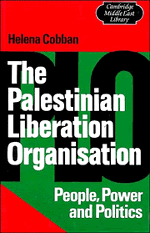Book contents
- Frontmatter
- Contents
- List of illustrations
- Preface
- Abbreviations
- Map 1 Palestine and the surrounding areas
- Introduction
- Part I History of the PLO mainstream
- Part II Internal relations
- PART III External relations
- Conclusions
- Appendixes
- 1 The political programme of the Sixteenth PNC, Algiers, 22 February 1983 (extracts)
- 2 The Palestine National Charter as revised by the Fourth PNC meeting, July 1968 (extracts)
- 3 Members of the PLO Executive Committee elected February 1983
- 4 List of regular sessions of the Palestinian National Council, May 1964 to February 1983
- 5 Fateh Central Committee elected April/May 1980
- Notes
- References and select bibliography
2 - The Palestine National Charter as revised by the Fourth PNC meeting, July 1968 (extracts)
Published online by Cambridge University Press: 26 January 2010
- Frontmatter
- Contents
- List of illustrations
- Preface
- Abbreviations
- Map 1 Palestine and the surrounding areas
- Introduction
- Part I History of the PLO mainstream
- Part II Internal relations
- PART III External relations
- Conclusions
- Appendixes
- 1 The political programme of the Sixteenth PNC, Algiers, 22 February 1983 (extracts)
- 2 The Palestine National Charter as revised by the Fourth PNC meeting, July 1968 (extracts)
- 3 Members of the PLO Executive Committee elected February 1983
- 4 List of regular sessions of the Palestinian National Council, May 1964 to February 1983
- 5 Fateh Central Committee elected April/May 1980
- Notes
- References and select bibliography
Summary
Source: Leila S. Kadi, Basic Political Documents of the Armed Palestinian Resistance Movement, Beirut: PLO Research Center, 1969, pp. 137–142.
Article 1: Palestine is the homeland of the Arab Palestinian people; it is an indivisible part of the Arab homeland, and the Palestinian people are an integral part of the Arab nation.
Article 2: Palestine, with the boundaries it had during the British mandate, is an indivisible territorial unit…
Article 4: The Palestinian identity is a genuine, essential and inherent characteristic; it is transmitted from parents to children. The Zionist occupation and the dispersal of the Palestinian Arab people, through the disasters which befell them, do not make them lose their Palestinian identity and their membership of the Palestinian community, nor do they negate them.
Article 5: The Palestinians are those Arab nationals who, until 1947, normally resided in Palestine regardless of whether they were evicted from it or have stayed there. Anyone born, after that date, of a Palestinian father … whether inside Palestine or outside it … is also a Palestinian.
Article 6: The Jews who had normally resided in Palestine until the beginning of the Zionist invasion will be considered Palestinians…
Article 8: The phase in their history, through which the Palestinian people are now living, is that of national struggle for the liberation of Palestine. Thus the conflicts among the Palestinian national forces are secondary, and should be ended for the sake of the basic conflict that exists between the forces of Zionism and of imperialism on the one hand, and the Palestinian Arab people on the other…
Article 9: Armed struggle is the only way to liberate Palestine. Thus it is the overall strategy, not merely a tactical phase.
- Type
- Chapter
- Information
- The Palestinian Liberation OrganisationPeople, Power and Politics, pp. 267 - 268Publisher: Cambridge University PressPrint publication year: 1984
- 1
- Cited by

